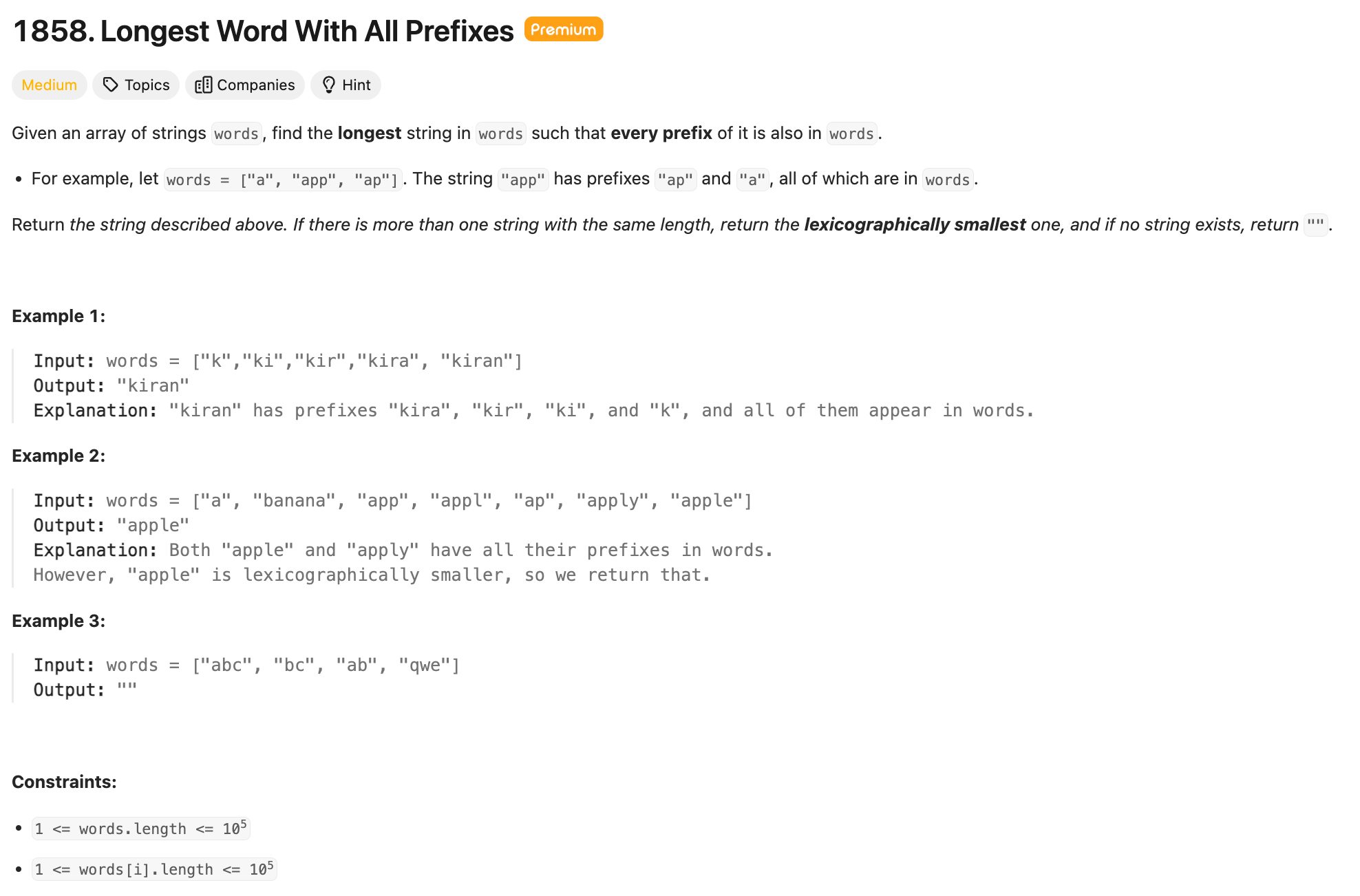Problem of The Day: Longest Word With All Prefixes
Problem Statement

Intuition
The problem asks to find the longest word that can be built one character at a time by other words in the list. My initial thought is to use a trie data structure, which is well-suited for prefix-based problems like this.
Approach
- Build the Trie: Insert all words into the trie. Each node represents a character of a word, and we mark the end of a word with a special character, say
##. - Validate Words: For each word, check if all prefixes of this word exist in the trie. If they do, consider this word as a potential answer.
- Select the Longest Word: Track the longest word that satisfies the prefix condition. If there are multiple words of the same length, select the lexicographically smallest one.
Complexity
-
Time complexity: \(O(n \cdot m)\), where \(n\) is the number of words and \(m\) is the maximum length of a word. We build the trie and then search for the valid word.
-
Space complexity: \(O(n \cdot m)\), since the trie stores all characters of all words.
Code
class Solution:
def longestWord(self, words: List[str]) -> str:
res = ""
trie = {}
for word in words:
curr = trie
for c in word:
if c not in curr:
curr[c] = {}
curr = curr[c]
curr['#'] = True
for word in words:
curr = trie
valid = True
for c in word:
if c in curr:
curr = curr[c]
if '#' not in curr:
valid = False
break
if valid:
if len(res) < len(word):
res = word
elif len(res) == len(word):
res = res if res < word else word
return res
Editorial
Approach 1: Hash Set
class Solution:
def longestWord(self, words: List[str]) -> str:
# Sort the words lexicographically
words.sort()
# Set to store valid words
valid_words = set()
longest_valid_word = ""
# Iterate through each word
for current_word in words:
# Check if the word is of length 1 or if its prefix exists in the set
if len(current_word) == 1 or current_word[:-1] in valid_words:
# Add the current word to the set of valid words
valid_words.add(current_word)
# Update the longest valid word if necessary
if len(current_word) > len(longest_valid_word):
longest_valid_word = current_word
# Return the longest valid word found
return longest_valid_word
- time: O(l*n*logn) where n is length of word, l is the length of the longest word
- space: O(n*l+S)
Approach 2: Trie
class Solution:
def longestWord(self, words: List[str]) -> str:
trie = Trie()
longest_valid_word = ""
# Insert all words into the trie
for word in words:
trie._insert(word)
# Check each word and update the longest valid word
for word in words:
if trie._has_all_prefixes(word):
if len(word) > len(longest_valid_word) or (
len(word) == len(longest_valid_word)
and word < longest_valid_word
):
longest_valid_word = word
return longest_valid_word
class Trie:
class TrieNode:
def __init__(self):
self.children = {}
self.is_end_of_word = False
def __init__(self):
self.root = self.TrieNode()
# Insert a word into the trie
def _insert(self, word):
node = self.root
for char in word:
if char not in node.children:
node.children[char] = self.TrieNode()
node = node.children[char]
node.is_end_of_word = True
# Check if all prefixes of the word exist in the trie
def _has_all_prefixes(self, word):
node = self.root
for char in word:
if (
char not in node.children
or not node.children[char].is_end_of_word
):
return False
node = node.children[char]
return True